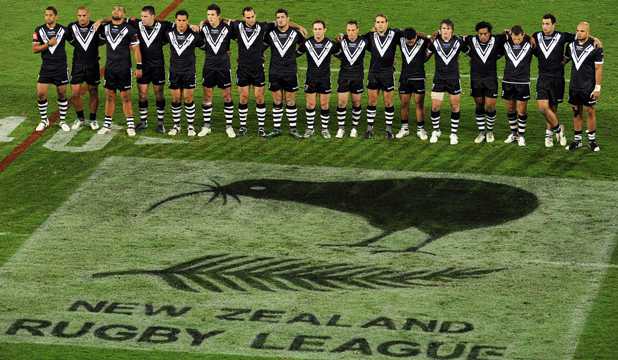OPINION: WITH ALL due respect to the NZRL, there’s something deeply disturbing about the proposal to stage a so-called Anzac league test in Turkey in 2015.

Let’s call the Last Post on this farce: The Kiwis line up to face the Kangaroos last weekend.
Fair enough; playing a footy match to commemorate the landing at Gallipoli (where 11,421 Aussies and Kiwis perished) may have seemed a bright idea when first mooted at executive level. But you’d think cooler, or at least more sensitive minds might have eventually prevailed. It simply feels wrong on so many levels.
It’s true, league is not on its own, here. Sport has always had this thing about comparing itself with war. Clearly not content with the standard theatre and drama it offers in the name of entertainment, it continually seeks non-existent parallels with the battlefield. League is merely the most recent example of this. The NZRL’s marketing slogan: “More than just a Game” is a delightful self-portrait; managing to sound both defensive and delusional in five easy words.
For all that, the idea of league trying to boost its reputation and relevance (not to mention its coffers) by hanging on to war’s coat-tails is about as embarrassing as it gets. No wonder sport is so often lampooned for losing perspective. It’s bad enough that a commercial sporting event should even be using the “Anzac” tag for publicity, but this Turkey plan borders on the obscene. Good grief, why don’t we just party on the graves?
From what I’ve read, most of the soldiers who survived either of the world wars preferred to keep their sport firmly in context. Former New Zealand cricketers Frank Cameron and Artie Dick spoke recently of the culture clash within the post WWII teams: the players who had served in the conflict and those who hadn’t. The first group tended to compete hard, accept a win or a loss magnanimously and play hard afterwards. The second were, typically, more obsessive and intense.
In Greg Growden’s fabulous biography of Australian Bodyline batsman Jack Fingleton, it was again evident that the war veterans refused to treat sport as seriously as many of the peacetime players. The dashing all-rounder Keith Miller was regularly at odds with Don Bradman on the 1948 tour of England, at times refusing to bat or bowl in protest against his captain’s ruthless tactics. Unlike Miller, Bradman hadn’t seen any WWII action.
The point of all this? Only that those poor blighters unfortunate enough to be caught up in either of the Great Wars knew where sport stood in the scheme of things. It was a game, just a game and certainly no more than a game. It was something to be played for fun. Those people knew what real drama was; they’d seen it with their own eyes. The horror, the death, the putrid smell of decay; they’d witnessed first-hand what genuine loss meant. And it had nothing to do with sport.
League is trying far too hard. Presumably, many grocers fell at Gallipoli as well as footy players, along with butchers, bakers and candlestick-makers. Builders, plumbers, sparkies and farmers; salesmen and drivers, alike. Yet, as far we’ve heard, there are no plans for any of these industries to hold their 2015 annual conferences in Turkey. Only sport, represented in this instance by the NZRL, could be fat-headed enough to think along those lines.
Quite apart from that, there’s also the irony of the Turkey proposal. After all, the Aussie league fraternity didn’t even really support WWI; they avoided it like the plague. Check out any credible historical account and it will tell a similar story. Australian historian Michael McKernan estimated about 75% of unmarried Aussie league players somehow managed to avoid serving. The NSWRL Roll of Honour, for first-grade players or officials killed in WWI, numbers 10, including the secretary.
The purpose of this is not to belittle, of course; just to highlight the hypocrisy of the latest brainwave. Many were the reasons for Aussie’s new working-class sport not supporting the war. But the glaring reality is that, collectively, it did not. In 1915, as a comparison, it was reported that 197 out of 220 of Sydney’s regular first-grade rugby union players were in active service. London’s Daily Telegraph estimated 5000 Aussie union players served; about 98% of all adult playing numbers.
As another Australian historian, Sean Fagan of website RL1908.com, notes, the NSWRL’s decision to continue playing its competition throughout the war, unlike union, was also controversial. Many considered it a reason for the 13-man code subsequently gaining an ascendancy over its rival. At the height of the debate the NSW Labor Premier went as far as calling on all able-bodied sports-men to do more to help their mates. “Your comrades at Gallipoli are calling you,” he exhorted. “This is not the time for football and tennis matches. It is serious. Show you realise this by enlisting at once.” Yet, even then, Aussie league’s finest avoided serving in their droves. There was no full draft and clearly, many had their reasons for not volunteering, not least a simmering hatred for the English. Nothing wrong with that, of course. But whichever way you look at it, Gallipoli and Aussie league have never had much in common.
All the more extraordinary, then, that the powers-that-be should be attempting to make a connection between today’s annual trans-Tasman league fixture and the historic WWI battleground. It doesn’t as much seem wrong as downright distasteful, the idea of trading off the heroism, bravery and spirit of our Gallipoli veterans; in a tacky attempt to associate their privations and sacrifice with a tin-pot game of footy.
More than just a game? Hopefully the NZRL will soon come to its senses.
– Sunday Star Times
via Why the Anzac test is a turkey | Stuff.co.nz.

Leave a Reply